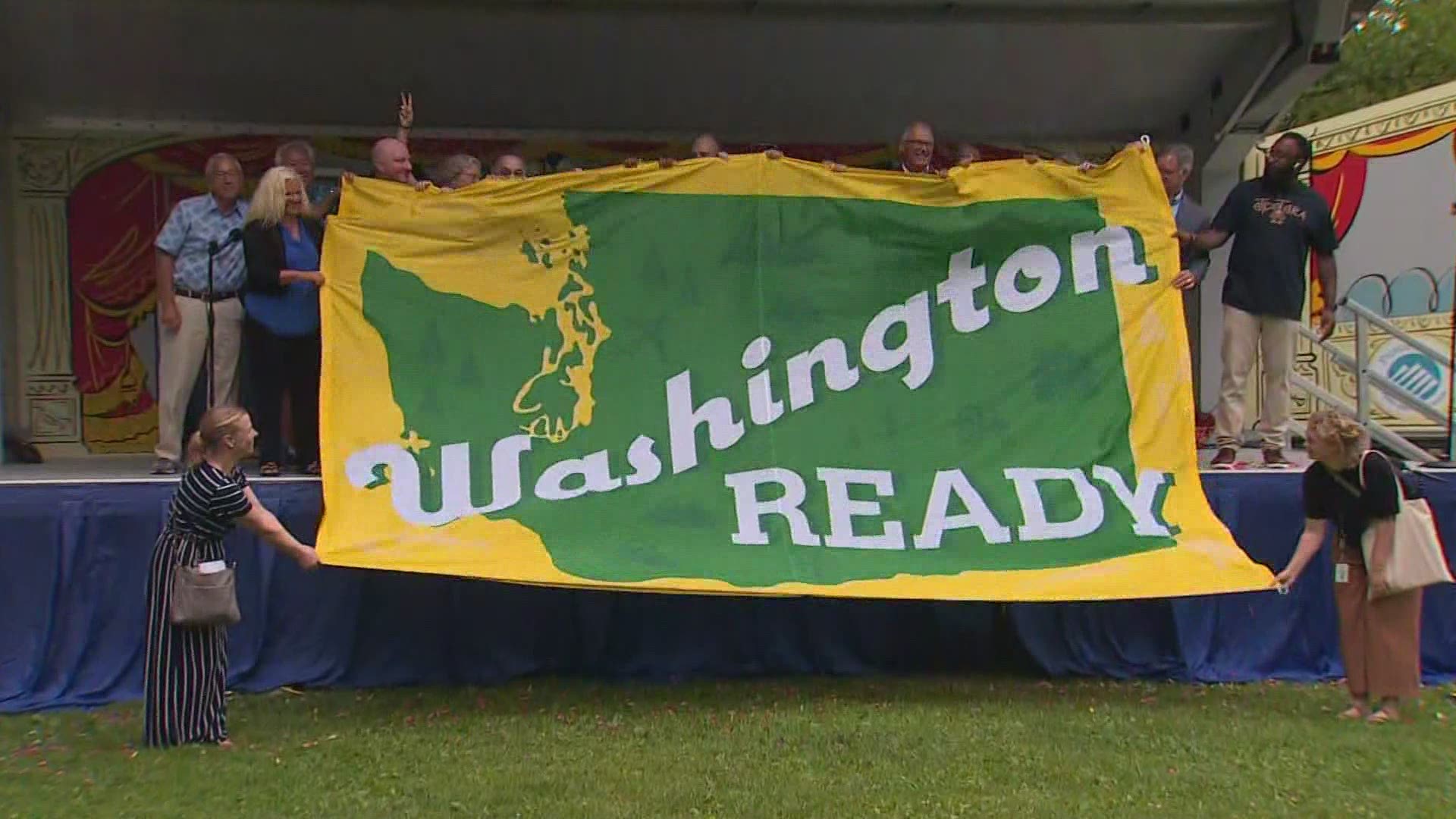OLYMPIA, Wash. — As of Wednesday, June 30, Washington state is open for business after lifting most COVID-19 restrictions after more than a year.
The first stay-at-home orders were announced on March 23, 2020.
On Wednesday, the state moved past Gov. Jay Inslee's "Roadmap to Recovery" plan, and all businesses were able to return to normal capacity and operations. Since May, all counties have been in the third phase of a four-stage reopening plan, with indoor capacity limited at 50%.
Masking requirements for the state will continue to abide by guidelines established by the Centers for Disease Control and Prevention (CDC). Currently, masks are required for unvaccinated people in indoor public settings, in outdoor crowded settings, and in indoor sports practices and competitions. Everyone is required to wear a mask in schools, childcare facilities, health care facilities, correctional facilities, homeless shelters and public transportation.
King County, Washington's most populous county, reverted to CDC masking guidance Tuesday, lifting Health Officer Dr. Jeff Duchin's mask directive after 70% of residents ages 16 and older became fully vaccinated.
The only limitation still in place following Wednesday's reopening applies to large indoor events, which are defined as any event with more than 10,000 simultaneous participants in an enclosed space. The state will still restrict these events to 75% capacity unless all attendees are vaccinated. The restrictions will be reevaluated on July 31, according to Inslee’s office.
Inslee attended two reopening celebrations Wednesday, one in Pierce County and another in Spokane County, and said the state is "ready" for reopening.
"We've done reasonable things, but now I think this reopening, I think we'll see a huge spurt of business, and I'm anxious to get that going," said Inslee. "We're ready to go. We're ready to go because we did a good job during COVID."
On Thursday, The governor will attend a celebration in King County at 8 a.m. before touring Pike Place Market.
Washington continues to work on reaching its 70% vaccination goal
The June 30 reopening comes despite the state not reaching its goal of getting 70% of residents ages 16 and older at least initiating their vaccination series.
Since his May announcement, Inslee developed several initiatives aimed at getting more people vaccinated, including a statewide lottery, and a similar lottery system for the state's military members.
As of Tuesday, the state Department of Health (DOH) reported just over 68% of residents ages 16 and up had started their vaccinations. However, the state has reached 70% of residents 18 and older initiating their vaccination series, according to CDC data.
The state, which had the country's first confirmed COVID-19 case, has seen over 414,000 confirmed cases of the virus and 5,911 deaths.
'The pandemic is not over': State health officials urge more vaccinations
Dr. Umair Shah, Washington state's secretary of health, began Wednesday's reopening briefing with a celebration, but quickly followed up with a warning.
"We want to make sure people recognize this pandemic is not over. It's far from over," Shah said.
While the state is nearing its 70% vaccination goal, some pockets of the state are still battling low vaccination rates and vaccine hesitancy.
"It is a tale of two societies and we want to do everything we can to recognize those who are unvaccinated are still unprotected," Shah said.
People over 45 who are unvaccinated are 16 times more likely to be hospitalized from COVID-19 complications than vaccinated individuals, according to DOH data. In addition, some groups still aren't able to be vaccinated, like those with prohibitive medical issues, and children under 12.
"We are seeing very large pockets of low immunization, and we have a whole very precious part of the community, which are children, that are unvaccinated," said Washington State Epidemiologist Dr. Scott Lindquist.
Health officials are concerned about COVID-19 outbreaks in areas where vaccination rates are lower as the state continues to reopen.
"You have people who are unprotected still thinking they are fine and thinking everything is back to normal and getting in trouble because they are unprotected," Shah said.
"Today is the day to celebrate, it's a day to commemorate, it's a day to be excited about, it's a day to get back to some level of normalcy, especially those who are vaccinated," he said.
Some industries struggle to fully reopen
Still, some venues and businesses have already announced special offers and events to mark the reopening, which comes just days before the Fourth of July.
The Seattle Mariners, for example, announced its first full-capacity game at T-Mobile Park since September 2019 on July 2 with a fireworks show and a special tribute to frontline workers.
The Washington Hospitality Association President and CEO Anthony Anton held a media briefing Tuesday to celebrate the reopening and give an update on the state of the industry.
One of the biggest things Anton pointed to as a challenge for the state's reopening is the huge worker shortage the hospitality industry faces. He said that the industry in Washington faces an 80,000 worker shortfall, currently.
While there have been efforts to hire back staff quickly, even amid the economic downturn, restaurants, bars and hotels have struggled to bring back their workforce.
Anton said these businesses are trying to incentivize employees by offering perks like added health benefits and bonuses, as well as encouraging Washingtonians that it is safe to head back to these establishments for work and entertainment.
"We’re very excited to move forward. The consumer confidence should be high," he said.
During the briefing, Anton said he expects to see a boom in restaurants with the return of entertainment venues and hotels following at a distance based on how much business they lost in the latter parts of 2020.
Washington hotels saw a 61.3% decrease in business last year. Seattle felt the brunt of those losses with a 77% drop in business.
However, Anton voiced confidence, adding, "Weathering these crises makes you stronger as an operator."

